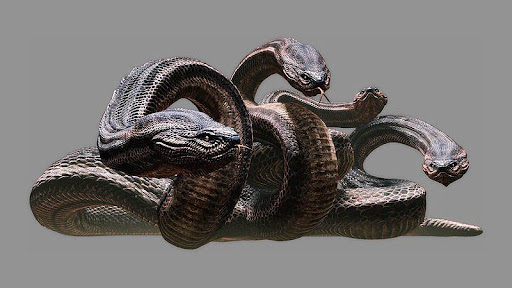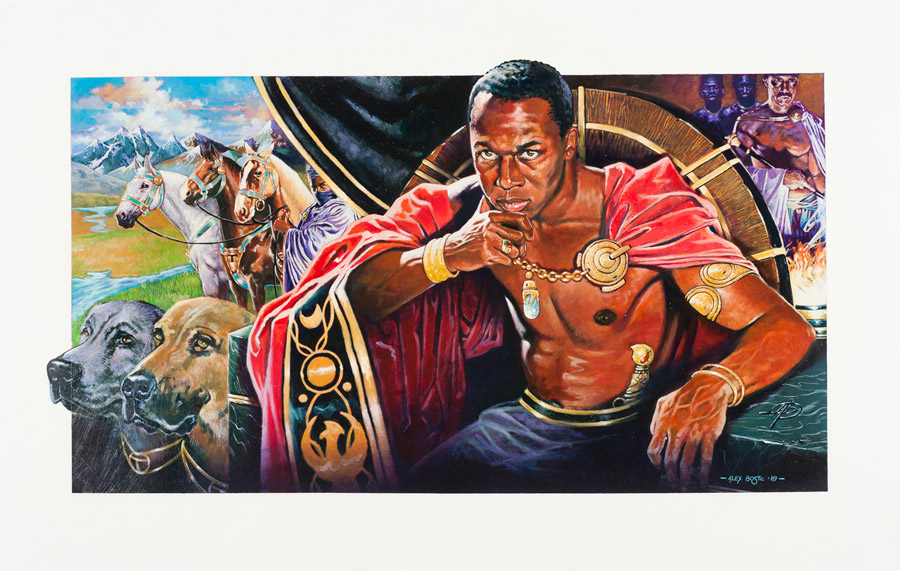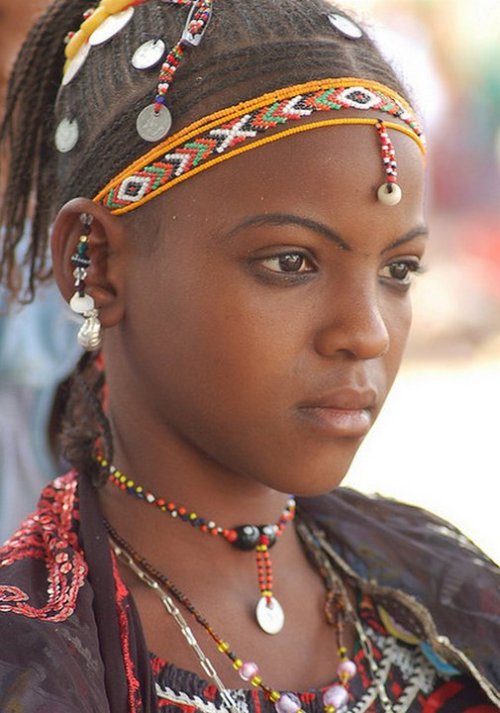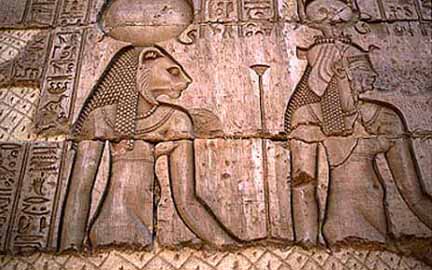Post by anansi on Jun 16, 2013 6:31:45 GMT -5
The tale of Bida the Black Snake


This is another tale from ancient Ghana or Ouagadougou some time spelled Wagadgu this may have an allusion to a drought that helped ushered in the final collapse of the Empire, they had been fighting off the Almoravids who were carving out an empire that stretched from the Senegal river to Iberia although that venture failed they non the least had to deal with a sever drought now understand these were not a people of the book and although they traded with Muslims the Kings had very little interest in their religion although some of it's people were already Muslims,the combination of war and drought drew the attention of the Malian up start who succeeded where the Almorivids failed. It is known that like other non people of the book they had human sacrifice as a matter of fact it would be reminiscent of story of Perseus vs the Kraken or the Hydra whose king sacrificed beautiful young virgins to ward off his wrath or even the story of king Kong same basic theme.

Siya Yatabare
For the Soninke people, the decline of their empire was due to the legend of Wagadu, and the rupture of the pact between the empire and the black snake. This happened after the nobles chose Siya Yatabare as the annual sacrifice.
She was the most beautiful and “cleanest” virgin girl in that year, but she was also engaged to be married. Her fiancé, Maadi, was the son of Djamere Soukhounou whose unique quality was that he always did what he promised. When Maadi was told him what would happen, that his fiancée would be given to “Bida” - the black snake of Wagadu, he promised Siya that she would not die in the well of Wagadu.
Siya tried to convince him that it is her destiny, that he should let her to be the gift to the snake in order to save the Empire, but Maadi refused. Within days, he asked his friend, the blacksmith of his village named Bomou, to sharpen his saber.
When the day came, Maadi set on his way in the direction of the well of Wagadu. Siya Yatabare was well dressed and her hairstyle was in plaited with gold. The praise-singer encouraged her, as did her family. When they left, she saw Maadi and they both fell in tears. Siya told him that if he killed the snake, Wagadu would not have any more rain and the empire would be destroyed forever. Maadi refused, saying their destinies are ratified. He left her and hid himself nearby to wait for the snake.
The snake of Wagadu had seven heads. When the snake took out his first head, Maadi cut it. He did the same to all the others. When the snake took out his last head, the one in silver, the night became clear like the day. The snake said, “I swear by the lord of seven head, during seven years and seven bad years, and during seven months and seven bad months, during seven days and seven bad days, Wagadu will not receive any rain and any piece of gold”.
Maadi did not mind, and cut the last head. The snake died. Maadi gave to Siya his shoes, the sheath of his saber, his ring, his “danan koufoune” cap. He told her that, if tomorrow they ask you some clarifications, give them those things. Maadi went to his village and told all the details to his mother. She said “you are my only son and it is because of your fiancée that you killed the “Bida”, however, the nobles of Wagadu will try to punish you. I swear in the memory of your father that I will do everything to protect you from Wagadu.”
When the sun came up, the nobles asked the prise-singer to go check the well of Wagadu. When they saw Siya, and the heads of the snake in the well, they asked her what happened. As an answer, she gave them the shoes and all the things that Maadi gave her. The nobles of the 99 villages called everybody to come and try to wear the articles of clothing. When Maadi wore the shoes, the bonnet and the ring, everything fit. People knew that he killed the snake.
They were going to take him when his mother intervened and said: “I thought there were men in Wagadu, but I do not see any. You are afraid of the prediction of the snake even before you die. But there is something sure, nobody will kill my son because of a snake. I do not see any men here. You will know that my loincloth is better than all your trousers accumulated here. During those seven bad years and seven bad months and seven bad days, the needs of wagadu would be in my charge as an exchange of my son’s life and his marriage with Siya Yatabare.”

With shame, the notables of Wagadu concluded the agreement. After Djamere Shoukhouna died, the nobles of Wagadu met and decided that she did what she promised and the agreement was at end and the destiny of the nation would be accomplished. Wagadu went from fertile to dry, and there was no more rain. The children of Dingha, the Soninke, were forced to leave that place which became inhospitable. Thus every family went to his destiny that is the decline of the Ghana Empire - the end of the Soninke Empire.
mfsumareh.weebly.com/history-of-soninke.html


This is another tale from ancient Ghana or Ouagadougou some time spelled Wagadgu this may have an allusion to a drought that helped ushered in the final collapse of the Empire, they had been fighting off the Almoravids who were carving out an empire that stretched from the Senegal river to Iberia although that venture failed they non the least had to deal with a sever drought now understand these were not a people of the book and although they traded with Muslims the Kings had very little interest in their religion although some of it's people were already Muslims,the combination of war and drought drew the attention of the Malian up start who succeeded where the Almorivids failed. It is known that like other non people of the book they had human sacrifice as a matter of fact it would be reminiscent of story of Perseus vs the Kraken or the Hydra whose king sacrificed beautiful young virgins to ward off his wrath or even the story of king Kong same basic theme.

Siya Yatabare
For the Soninke people, the decline of their empire was due to the legend of Wagadu, and the rupture of the pact between the empire and the black snake. This happened after the nobles chose Siya Yatabare as the annual sacrifice.
She was the most beautiful and “cleanest” virgin girl in that year, but she was also engaged to be married. Her fiancé, Maadi, was the son of Djamere Soukhounou whose unique quality was that he always did what he promised. When Maadi was told him what would happen, that his fiancée would be given to “Bida” - the black snake of Wagadu, he promised Siya that she would not die in the well of Wagadu.
Siya tried to convince him that it is her destiny, that he should let her to be the gift to the snake in order to save the Empire, but Maadi refused. Within days, he asked his friend, the blacksmith of his village named Bomou, to sharpen his saber.
When the day came, Maadi set on his way in the direction of the well of Wagadu. Siya Yatabare was well dressed and her hairstyle was in plaited with gold. The praise-singer encouraged her, as did her family. When they left, she saw Maadi and they both fell in tears. Siya told him that if he killed the snake, Wagadu would not have any more rain and the empire would be destroyed forever. Maadi refused, saying their destinies are ratified. He left her and hid himself nearby to wait for the snake.
The snake of Wagadu had seven heads. When the snake took out his first head, Maadi cut it. He did the same to all the others. When the snake took out his last head, the one in silver, the night became clear like the day. The snake said, “I swear by the lord of seven head, during seven years and seven bad years, and during seven months and seven bad months, during seven days and seven bad days, Wagadu will not receive any rain and any piece of gold”.
Maadi did not mind, and cut the last head. The snake died. Maadi gave to Siya his shoes, the sheath of his saber, his ring, his “danan koufoune” cap. He told her that, if tomorrow they ask you some clarifications, give them those things. Maadi went to his village and told all the details to his mother. She said “you are my only son and it is because of your fiancée that you killed the “Bida”, however, the nobles of Wagadu will try to punish you. I swear in the memory of your father that I will do everything to protect you from Wagadu.”
When the sun came up, the nobles asked the prise-singer to go check the well of Wagadu. When they saw Siya, and the heads of the snake in the well, they asked her what happened. As an answer, she gave them the shoes and all the things that Maadi gave her. The nobles of the 99 villages called everybody to come and try to wear the articles of clothing. When Maadi wore the shoes, the bonnet and the ring, everything fit. People knew that he killed the snake.
They were going to take him when his mother intervened and said: “I thought there were men in Wagadu, but I do not see any. You are afraid of the prediction of the snake even before you die. But there is something sure, nobody will kill my son because of a snake. I do not see any men here. You will know that my loincloth is better than all your trousers accumulated here. During those seven bad years and seven bad months and seven bad days, the needs of wagadu would be in my charge as an exchange of my son’s life and his marriage with Siya Yatabare.”

With shame, the notables of Wagadu concluded the agreement. After Djamere Shoukhouna died, the nobles of Wagadu met and decided that she did what she promised and the agreement was at end and the destiny of the nation would be accomplished. Wagadu went from fertile to dry, and there was no more rain. The children of Dingha, the Soninke, were forced to leave that place which became inhospitable. Thus every family went to his destiny that is the decline of the Ghana Empire - the end of the Soninke Empire.
mfsumareh.weebly.com/history-of-soninke.html



